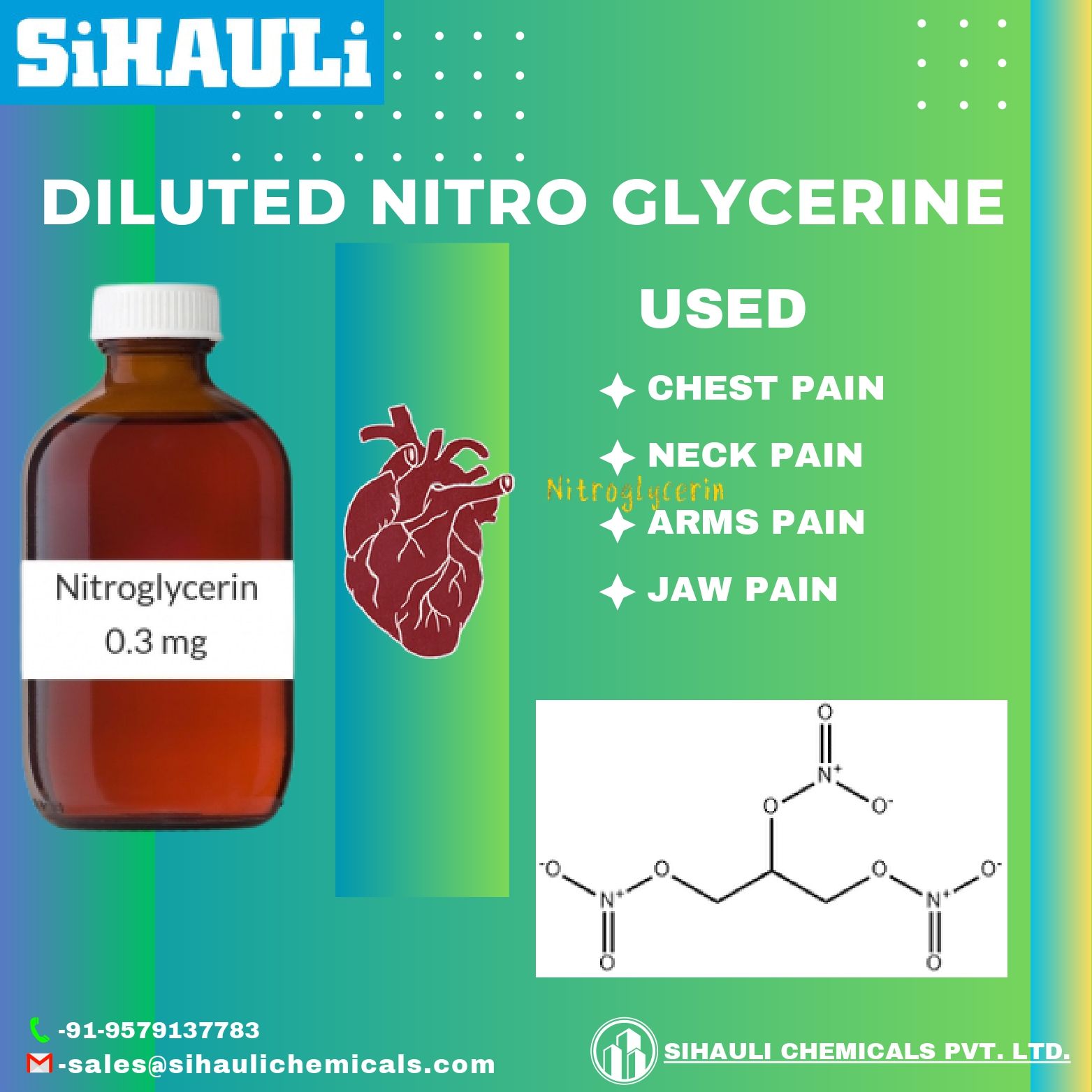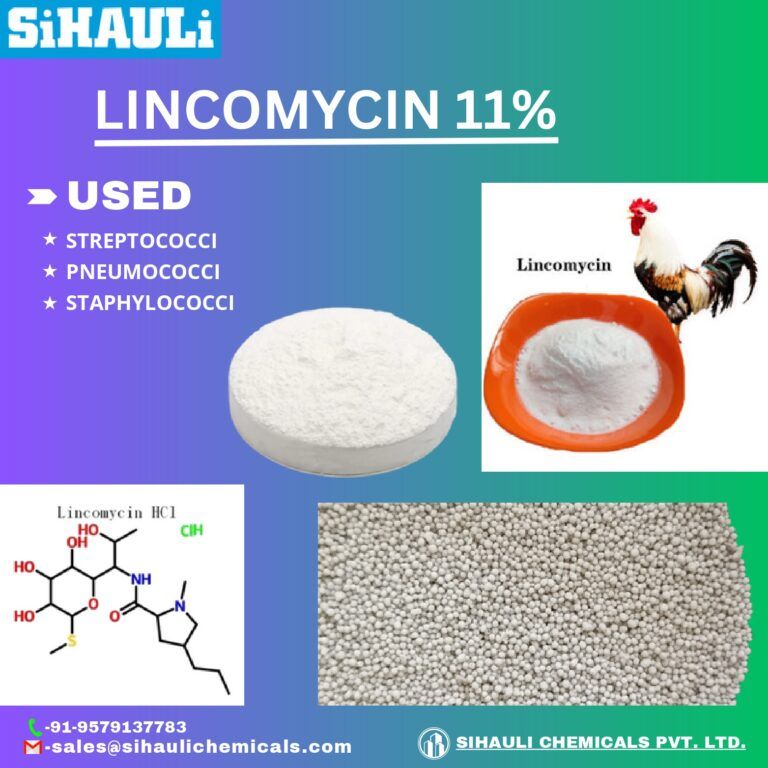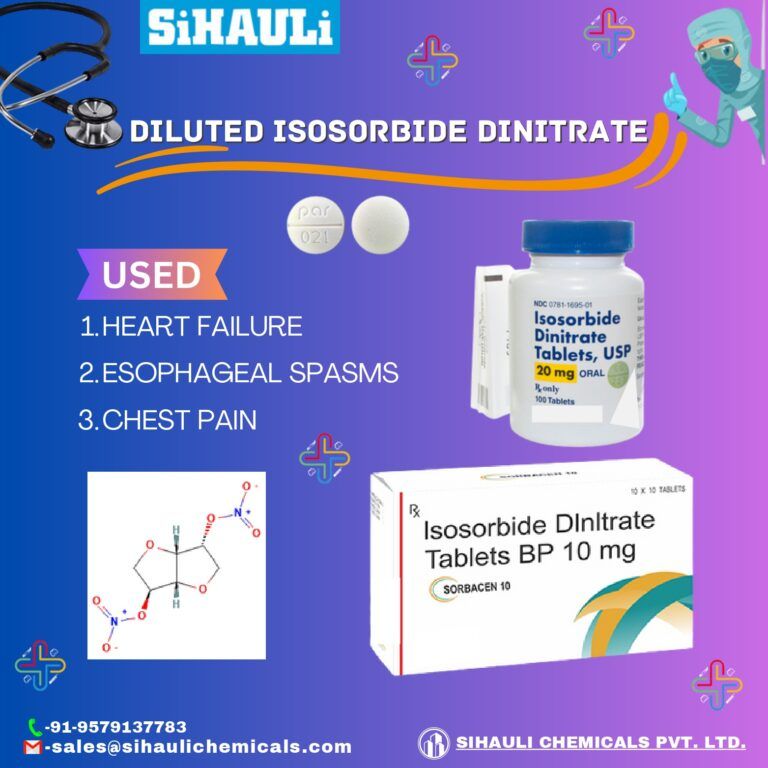Nitroglycerin is used to treat angina (chest pain). Angina is a pain or discomfort that happens when part of your heart does not get enough blood. It feels like a pressing or squeezing pain. It can happen in your chest, neck, arms (usually the left one), and lower jaw.
Highlights for nitroglycerin
- Nitroglycerin sublingual tablet is available as both a generic and a brand-name drug. Brand name: Nitrostat.
- A sublingual tablet is a tablet that you dissolve under your tongue or inside your cheek. Nitroglycerin also comes as a spray, aerosol solution, transdermal patch, and ointment. In addition, it comes in an injectable form that’s only given by a healthcare professional.
- Nitroglycerin sublingual tablet is used to stop or prevent angina (chest pain).
Important warnings
Low blood pressure: This drug may lower your blood pressure. This can cause lightheadedness, dizziness, and fainting when you stand up. This is called orthostatic hypotension. It may happen as soon as you take the drug. You should sit down while taking this medication and then stand up slowly. Your doctor may check your blood pressure before and during your treatment with this drug.
What is nitroglycerin?
Nitroglycerin sublingual tablet is a prescription drug that’s available as the brand-name drug Nitrostat. It’s also available as a generic drug. Generic drugs usually cost less than the brand-name version. In some cases, they may not be available in all strengths or forms as the brand-name drug.
Nitroglycerin also comes as a spray, aerosol solution, transdermal patch, and ointment. It also comes in an injectable form that’s only given by a healthcare professional.
To take the sublingual tablet, you place it under your tongue or inside your cheek and let it dissolve.
Why it’s used
Nitroglycerin is used to treat angina (chest pain). Angina is a pain or discomfort that happens when part of your heart does not get enough blood. It feels like a pressing or squeezing pain. It can happen in your chest, neck, arms (usually the left one), and lower jaw.
How it works
Nitroglycerin belongs to a class of drugs called vasodilators. A class of drugs is a group of medications that work in a similar way. These drugs are often used to treat similar conditions.
Nitroglycerin works by relaxing the smooth muscle and blood vessels in your body. This increases the amount of blood and oxygen that reaches your heart. In turn, your heart doesn’t work as hard. This reduces chest pain.
Nitroglycerin side effects
Nitroglycerin can cause dizziness during the first few hours after you take it. You shouldn’t drive or use machinery until you know how this medication affects you. This drug can also cause other side effects.
More common side effects
The more common side effects of nitroglycerin can include:
- headache
- dizziness
- weakness
- fast heart rate
- nausea
- vomiting
- flushing (reddening and warming of your skin)
- rash
If these effects are mild, they may go away within a few days or a couple of weeks. If they’re more severe or don’t go away, talk to your doctor or pharmacist.
Serious side effects
Call your doctor right away if you have serious side effects. Call 911 if your symptoms feel life threatening or if you think you’re having a medical emergency. Serious side effects and their symptoms can include the following:
- Low blood pressure. Symptoms can include:
- dizziness or lightheadedness
- fainting
- blurry vision
- nausea
- cold and clammy skin
- fast and shallow breathing
Disclaimer: Our goal is to provide you with the most relevant and current information. However, because drugs affect each person differently, we cannot guarantee that this information includes all possible side effects. This information is not a substitute for medical advice. Always discuss possible side effects with a healthcare professional who knows your medical history.
Nitroglycerin may interact with other medications
Nitroglycerin sublingual tablet can interact with other medications, vitamins, or herbs you may be taking. An interaction is when a substance changes the way a drug works. This can be harmful or prevent the drug from working well.
To help avoid interactions, your doctor should manage all of your medications carefully. Be sure to tell your doctor about all medications, vitamins, or herbs you’re taking. To find out how this drug might interact with something else you’re taking, talk to your doctor or pharmacist.
Examples of drugs that can cause interactions with nitroglycerin are listed below.
Drugs you should not use with nitroglycerin
You should not take certain drugs with nitroglycerin. Doing so can cause dangerous effects in your body. Examples of these drugs include:
- Sildenafil, tadalafil, vardenafil, and avanafil. Taking any of these drugs with nitroglycerin can cause very low blood pressure.
- Ergotamine. Taking these drugs together can cause more chest pain.
- Riociguat. Taking these drugs together can cause very low blood pressure.
Interactions that can make your drugs less effective
When you take nitroglycerin with certain drugs, nitroglycerin may not work as well to treat your condition. This is because the amount of nitroglycerin in your body may be decreased. Examples of these drugs include:
- Drugs used to treat depression such as amitriptyline, desipramine, and doxepin. These drugs may cause dry mouth and decrease the amount of saliva your mouth makes. This can make it harder for the tablet to dissolve in your mouth. This means that the drug may not work as well to treat your chest pain.
Disclaimer: Our goal is to provide you with the most relevant and current information. However, because drugs interact differently in each person, we cannot guarantee that this information includes all possible interactions. This information is not a substitute for medical advice. Always speak with your healthcare professional about possible interactions with all prescription drugs, vitamins, herbs and supplements, and over-the-counter drugs that you are taking.
Nitroglycerin warnings
Nitroglycerin sublingual tablet comes with several warnings.
Alcohol interaction
Drinking alcohol can increase your risk of very low blood pressure from this drug. If you drink alcohol, talk to your doctor.
Allergy warning
Allergic reactions to nitroglycerin are extremely rare, but they do occur. Symptoms can include:
- trouble breathing
- swelling of your throat or tongue
If you have an allergic reaction, call your doctor or local poison control center right away. If your symptoms are severe, call 911 or local emergency services or go to the nearest emergency room.
Don’t take this drug again if you’ve ever had an allergic reaction to it. Taking it again could be fatal (cause death).
Warnings for people with certain health conditions
For people with a history of heart attack or heart failure: It isn’t known if this drug will help you during a heart attack. A heart attack may cause severe, crushing pain that comes on suddenly. If you have signs of a heart attack, call 911 right away. It also isn’t known if this drug helps people with heart failure. If you use this drug in this situation, it may lower your heart rate and blood pressure.
Warnings for other groups
For pregnant women: Studies of use of this drug in pregnant animals have not shown risk to the fetus. However, there aren’t enough studies done in humans to show if the drug poses a risk to a human pregnancy. Therefore, this drug should only be used if the potential benefit justifies potential risk.
Talk to your doctor if you’re pregnant or planning to become pregnant. Call your doctor right away if you become pregnant while taking this drug.
For women who are breastfeeding: Nitroglycerin may pass into breast milk and cause side effects in a child who is breastfed. Talk to your doctor if you breastfeed your child. You may need to decide whether to stop breastfeeding or stop taking this medication.
For children: This medication has not been studied in children. It should not be used in people younger than 18 years.
How to take nitroglycerin
This dosage information is for nitroglycerin sublingual tablet. All possible dosages and drug forms may not be included here. Your dosage, drug form, and how often you take the drug will depend on:
- your age
- the condition being treated
- how severe your condition is
- other medical conditions you have
- how you react to the first dose
Forms and strengths
Generic: Nitroglycerin
- Form: sublingual tablet
- Strengths: 0.3 mg, 0.4 mg, 0.6 mg
Brand: Nitrostat
- Form: sublingual tablet
- Strength: 0.3 mg, 0.4 mg, 0.6 mg
Dosage for angina (chest pain)
Adult dosage (ages 18 years and older)
- You should use the smallest dose that works to relieve your chest pain. Taking more of this drug than you need can lead to tolerance. This means that, over time, the drug may not work as well to treat your chest pain.
- Dissolve your dose under your tongue or in your cheek at the first sign of chest pain.
- You can repeat the dose once every 5 minutes until your chest pain gets better.
- If you’re still in pain after taking 3 doses in a 15-minute period, call 9-1-1 right away. You should also call 9-1-1 if your chest pain is different from normal.




